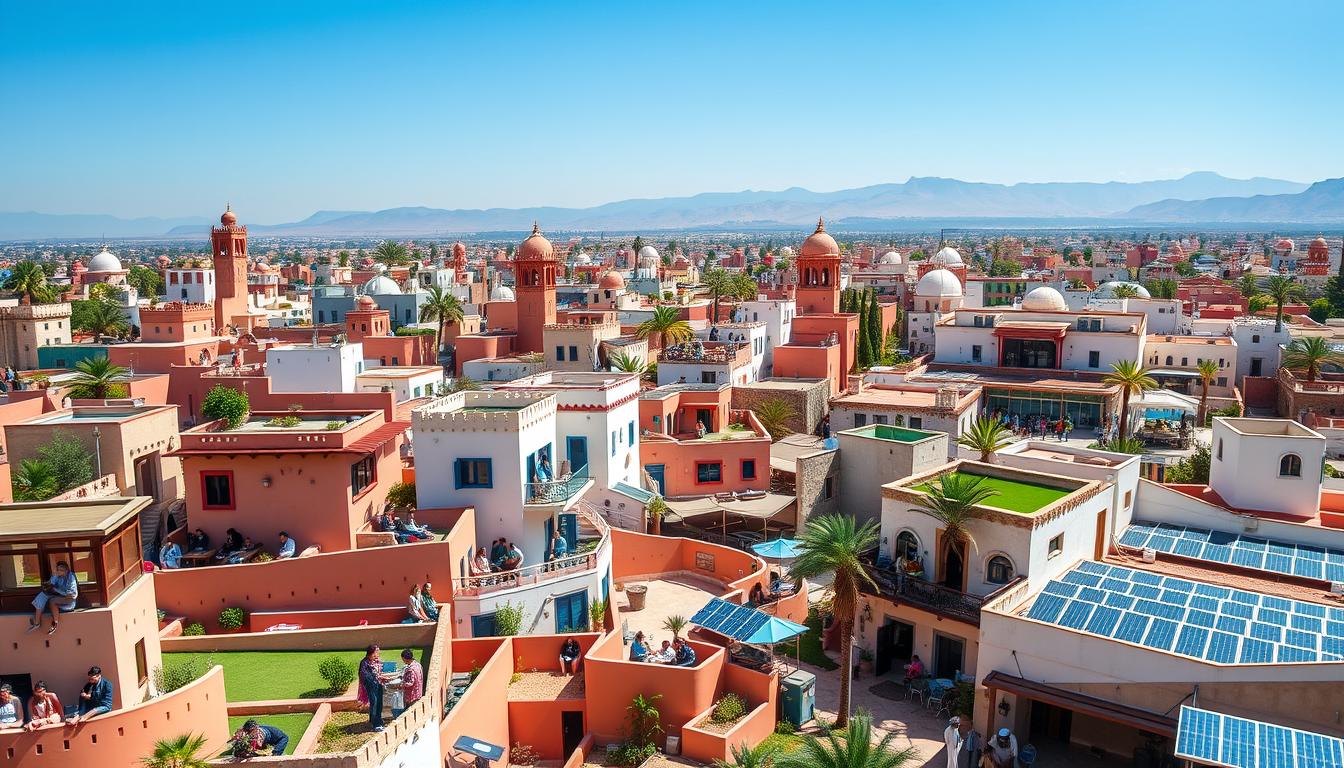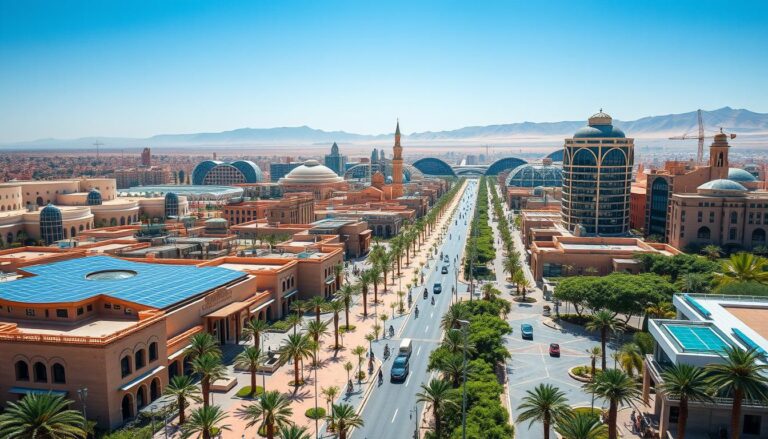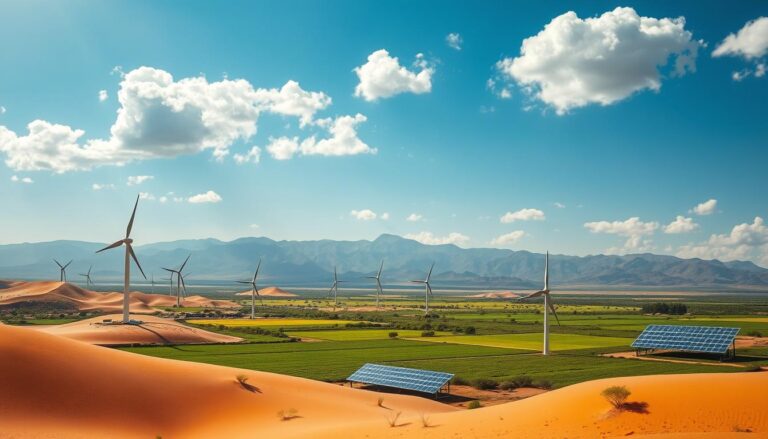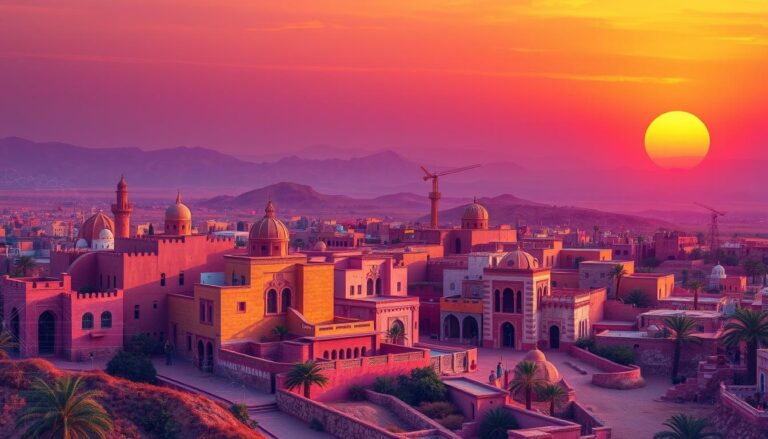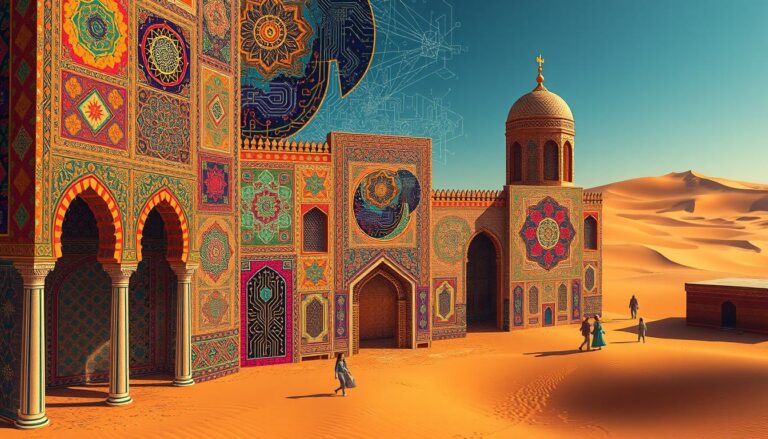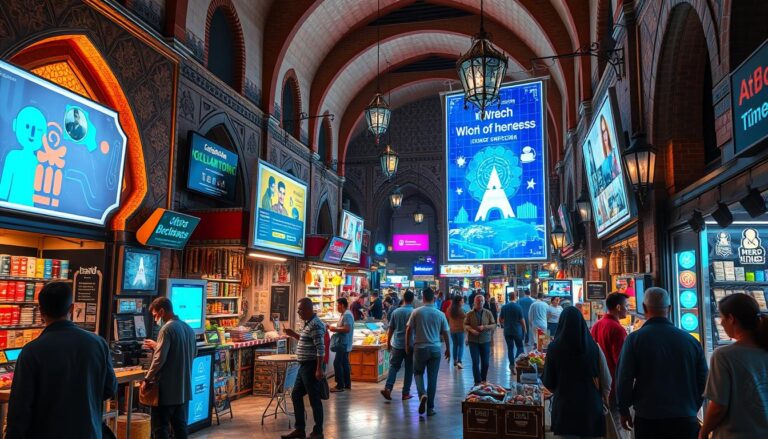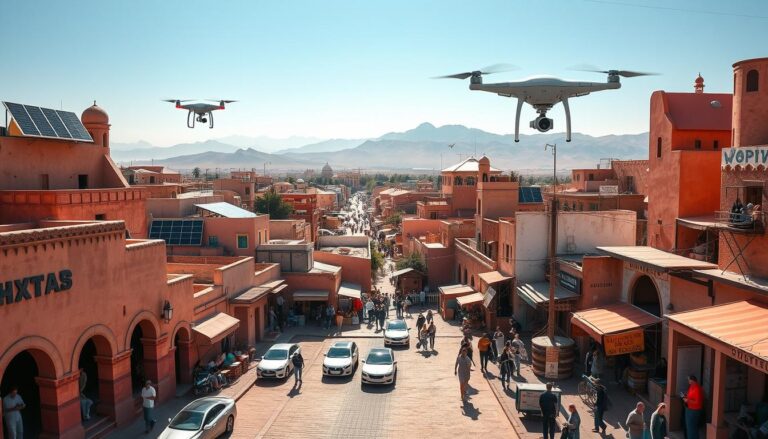Can Morocco’s economic growth under King Mohammed VI really close the gaps left by recent crises? Since 1999, Morocco has made big strides, moving from a low to a middle-income nation. Life expectancy has gone up by nine years, reaching seventy-five years on average. Income per capita has doubled in real terms.
The number of years of schooling in Morocco has almost doubled, from 8.1 to 14.6 years. These advancements show a bright future ahead.
But, the COVID-19 pandemic and environmental issues like droughts and the 2023 earthquake highlight the need for more jobs. Morocco has made progress in reducing poverty, from 15.3 percent in 2001 to 1.7 percent in 2019. Now, it must focus on investing in people, encouraging innovation, and creating a competitive business environment.
As Morocco boosts its renewable energy sector, aiming for 52 percent of its energy mix by 2030, questions emerge. How will this affect jobs and society? Can Morocco balance these advancements with fair economic growth?
Introduction to Morocco’s Economic Trajectory
King Mohammed VI has led Morocco on a path to economic modernization. His efforts have transformed key sectors of the economy. We will explore these modernization efforts, human development progress, and the challenges after COVID-19.
Modernization Efforts Under King Mohammed VI
King Mohammed VI has focused on big projects like expanding highways and improving the Tanger Med port. These projects help Morocco connect with global markets and boost its role in the world. He also invested in renewable energy and the car industry.
He set up the Mohamed VI investment fund and made governance reforms. These steps aim to grow the private sector and ensure sustainable development.
Progress in Human Development
Improving human development is a key goal for King Mohammed VI. He has worked to make healthcare universal, improve social protection, and enhance education. These efforts are crucial for sustainable growth and using Morocco’s human resources well.
The median age in Morocco was 28.4 years in 2019. This shows a young population ready to contribute to growth. By 2043, Morocco’s population is expected to grow, with more people living in cities.
Challenges Post-COVID-19
Despite progress, Morocco faces challenges after COVID-19. The pandemic and natural disasters like the Al Haouz earthquake have added to problems like poverty and joblessness. The real GDP growth fell from 8% in 2021 to 1.3% in 2022.
However, a recovery is underway. The real GDP grew by 3% in the first half of 2023. This growth is thanks to improvements in agriculture, tourism, and exports. Morocco needs to keep adapting its economic policies to continue modernizing and improving human development.
The Impact of Digitalization on Morocco’s Workforce
Morocco is moving forward economically, thanks to digital changes in key areas. The digital shift is seen in sectors like automotive and aerospace. These changes have boosted exports and improved ties with the world.
Digital Transformation in Key Sectors
The automotive and aerospace sectors show how digital changes have improved work and trade. Morocco’s IT sector in Casablanca is also growing fast. Big companies like IBM and Atos are moving there, thanks to the Digital Morocco 2020 plan.
Promoting Digital Literacy
Boosting digital skills is key to Morocco’s growth. In 2020, Morocco had a high smartphone use rate, ranking fifth in Arab countries. This helps create a workforce ready for today’s jobs.
Government Initiatives for Digital Workforce Development
The government is working hard to improve the workforce. They’ve set up tech parks and invested in tech. These steps help workers solve problems better and work more efficiently.
Sharing knowledge in IT also boosts innovation. But, there’s a problem with hiding important knowledge. The government is tackling this to make the most of digital skills. As these efforts grow, Morocco’s digital future looks bright, with a strong and ready workforce.
Remote Work in Morocco: Trends and Challenges
Remote work in Morocco is becoming more common. It offers new chances but also faces challenges. Employers and workers are adjusting to these changes, needing good digital setups and policies for remote work.
Adoption of Remote Work Models
Flexible work options are growing in Morocco. Laws allow for part-time and flexible hours. Workers get benefits based on their hours, showing a move towards varied work styles.
Infrastructure and Connectivity Issues
Despite the rise of remote work, connectivity is a big problem. Good internet is key for remote work. Moroccan laws also focus on keeping data safe, making sure employers protect it well.
Policies to Support Remote Work
Both the government and companies need to support remote work. Employers can choose what equipment to provide, showing the need for clear policies. Moroccan laws protect workers’ data, helping create a safe remote work space.
Automation and its Impact on Job Market Shifts
Automation is changing Morocco’s economy, affecting many sectors and jobs. The manufacturing sector is seeing big changes. Understanding these changes and finding ways to help workers is key.
Sectors Most Affected by Automation
Jobs that involve repetitive tasks are at risk of being automated. McKinsey says about 30% of work hours could be automated by 2030. This will hit jobs in manufacturing and data processing hard.
But, jobs that need human skills and complex thinking are safer. There’s a growing need for skilled workers in healthcare and STEM fields. This shows we need to focus on jobs that automation won’t take over.
Strategies to Mitigate Job Displacement
As automation grows, we must find ways to help workers. Here are some strategies:
- Reskilling and Upskilling: Training programs can teach workers new skills for new jobs.
- Policy Reforms: Governments can help with policies that support workers during changes.
- Job Creation Initiatives: Investing in growing sectors can create new jobs and balance out job losses.
Opportunities Created by Automation
Automation brings challenges, but also chances. It makes work more efficient, saving costs and time. It also lets workers do more creative and valuable work.
McKinsey says automation could create 250-280 million new jobs by 2030. This is thanks to growing incomes and spending in new markets.
In the end, automation is a big challenge, but it also offers chances for growth. It helps Morocco move towards a stronger and more advanced job market.
Skill Development in Morocco: Preparing for the Future
In Morocco’s fast-changing job market, skill development is key for economic strength. Upskilling and reskilling help fix the skills gap and get young people ready for work. With over 10 million young Moroccans, and 80% of the unemployed being young, the need for skill improvement is urgent.
Importance of Upskilling and Reskilling
Automation and digitalization are changing jobs. Upskilling in Morocco is vital to keep the workforce up to date. The high unemployment rate among university graduates shows the need for ongoing learning and adaptation. Programs like the USAID Career Center have helped over 200,000 youth and had over 1,283,000 users visit the Virtual Career Center.
Role of Educational Institutions
Education plays a big role in skill development. Two universities have added soft skills to their courses. Morocco’s biggest vocational training provider has also included these skills in over 300 centers. This prepares students for work and boosts their chances of getting a job.
Industry-Academia Partnerships
Partnerships between schools and businesses are crucial. Over 300 partnerships have been made to match education with job needs. Hilton, for example, has trained over 400 students and plans to hire 1,000 more as it grows in Morocco. These partnerships keep education relevant and open up more job opportunities.
In short, focusing on upskilling in Morocco, using education’s power, and building strong partnerships can prepare the workforce for the future. This ensures Morocco’s economy grows and stays strong in a fast-changing job market.
The Gig Economy Trends in Morocco
The gig economy is changing the Moroccan job market. It offers flexible employment opportunities for a tech-savvy workforce. Moroccan freelancers are embracing this change, seeking freedom and variety in their work.
KWIKS, an AI-driven recruitment startup in Morocco, is making waves. It raised 8 million dirhams from Azur Innovation Management. KWIKS aims to make hiring faster and cheaper with its AI solutions.
KWIKS connects employers with independent headhunters, a key service in today’s tech-driven job market. Its AI tools, like “HAFIDA” and “R2DS,” make hiring more efficient. This is important as the AI recruitment market is expected to grow to over $3 billion by 2027.
The Moroccan startup scene is thriving, thanks to government support. The “R&D Maroc 60 Startups” program is boosting innovation. Morocco is using AI in recruitment, showing how technology can transform the job market.
The 2014 census showed Morocco has about 6 million young people aged 15 to 24. Yet, only a third of new workers find jobs in the formal or informal sectors. Gig economy trends offer flexible employment opportunities for these young people, who want autonomy and variety in their careers.
The rise of gig economy trends and Moroccan freelancers is a big change in the job market. Startups like KWIKS are using AI to drive growth and diversity in employment. This is promising for Morocco’s economic future.
Workplace Innovation in Moroccan Companies
Moroccan companies are embracing new technologies and flexible work environments. This shift is crucial for staying competitive globally. They are investing in digital tools and innovative practices to boost productivity and attract top talent.
Adoption of New Technologies
Workplace technology adoption is key in Morocco’s corporate world. It’s driven by the need to stay ahead and tap into innovation. A global survey shows logistics pros, including in Morocco, see tech as vital for managing big changes.
The automotive industry in Morocco has seen over $10 billion in revenue. Digital tools have greatly improved productivity and efficiency.
Flexibility in Workplaces
Moroccan companies are moving towards more flexible work cultures. The US-Morocco Free Trade Agreement has boosted trade to nearly $7 billion a year. This has also diversified the workforce.
Flexible work environments are needed to adapt to these changes. Leading companies are updating their People strategy. They focus on fair pay and inclusion to create a productive and engaged team.
Building a Culture of Innovation
Creating an innovative culture is vital for Moroccan businesses to stay competitive. Insights from 12,200 voices, including 845 C-Suite executives, show the importance of resilient cultures and adaptable organizations. Companies are working on human-machine teaming for better work experiences.
Innovators like Jana, Managing Director and Partner at DHL Consulting, say digitalization and innovation are crucial. They help define new work models, especially in Morocco’s growing economy.
Morocco is set to benefit from investing in technology and flexible work cultures. A strong framework for continuous improvement and adaptability will ensure success for Moroccan businesses in the long run.
Investments in Human Capital During Economic Shifts
Investing in human capital is key for Morocco’s economic growth. Skills development boosts economic resilience and helps in Moroccan workforce development. Educational systems need to improve to stay competitive by 2030.
Improving vocational training and making professional development easier is crucial. This will create better jobs and close the productivity gap. It will empower more people to help the economy grow.
The Moroccan government sees a skilled workforce as essential for a strong economy. Expanding education at the secondary level, with help from the U.S., is vital. These efforts are key to handling economic ups and downs and ensuring growth.
Bilateral trade, like the Free Trade Agreement with the U.S. in 2006, boosts economic resilience. Trade has nearly quadrupled since then. This relationship brings economic gains and strengthens Morocco’s position.
Hosting the 2030 World Cup with Spain and Portugal will boost tourism and hospitality. Morocco aims for 26 million tourists by 2030. These sectors need more human capital investment to improve service quality.
Education, vocational training, and professional development are essential. They help build a strong workforce. This workforce is ready to tackle challenges and lead Morocco to a prosperous future.
Sustainability and Future Work Trends in Morocco
Morocco is moving towards a greener future. Sustainability is key in its work trends. The country aims to increase renewable energy and reach net-zero emissions. This change is vital for economic growth and protecting the environment.
Green Jobs and Renewable Energy Impact
The job market in Morocco is set to change for the better. The goal is to have 52% of energy from renewables by 2030. Right now, only 20% of electricity comes from wind, solar, and hydropower.
This move towards green energy will create more jobs. As industries become more eco-friendly, more people will find work.
Sustainable Practices in Workplace
Workplaces in Morocco are adopting green practices. The country has seen a big rise in temperature since the 1970s. It’s important for workplaces to use less energy and manage waste better.
Businesses are key in Morocco’s green journey. They help reduce energy use and waste.
Government Policies on Sustainability
The government’s policies are crucial for Morocco’s green efforts. The country’s carbon footprint is small, but it’s working to reduce it. Policies encourage renewable energy and balance economic growth with sustainability.
Morocco has a lot of wind energy potential. Over 90% of the country has steady wind. This shows Morocco’s commitment to a sustainable future.
Morocco is leading the way in sustainability. It’s preparing its workforce for a greener, more resilient future.
Conclusion
Morocco is moving forward in the world of work, focusing on digital, automation, and sustainability. The country has shown strength and flexibility, with a GDP growth of about 4.5% yearly from 2000-2014. It also added around 115,000 jobs each year during that time.
But, Morocco still faces challenges. The jobless rate is around 10%, and many people work in low-productivity areas like farming and unpaid jobs.
Morocco is focusing on improving skills, encouraging innovation, and being flexible at work. The labor force is growing at 2% yearly, adding 383,000 people annually. This highlights the need for better human capital and infrastructure investments.
Despite these hurdles, Morocco is committed to change and modernization. It aims to grow its economy by 6-7% and create about 35,000 jobs for every percentage point of growth.
In short, Morocco needs to keep working on skill gaps, technology, and sustainability. By doing so, it can build a strong economy for the future. This will ensure stability and prosperity for its people.
Source Links
- Morocco’s Long Road Toward Economic Transformation
- Morocco’s Economy Proves Resilient but Private Sector Faces Challenges
- Employment prospects for Moroccans Diagnosing the barriers to good jobs
- Overview
- Morocco – ISS African Futures
- Remote Working Policy in Morocco | Rivermate
- The Ultimate Guide to Hiring Remote Employees in Morocco for U.S. Companies
- Jobs lost, jobs gained: What the future of work will mean for jobs, skills, and wages
- How will automation affect economies around the world?
- USAID Career Center | Fact Sheet | Morocco | Archive – U.S. Agency for International Development
- The Workplace of The Future in Morocco | Stories From Hilton
- No title found
- Morocco’s KWIKS Raises $800K to Cut Recruitment Time by Two-Thirds Using AI
- No title found
- Future of Work in Logistics
- Diversification and growth: How the US-Morocco FTA boosts Rabat’s modern trade
- 2024 Global Talent Trends
- Climate Challenges & Opportunities in Morocco and Beyond
- Labour Market profile Morocco – 2023/2024
- Moroccan job market issues, and labour trends in the Middle East and North Africa
- World Bank Document

The Editorial Team is a passionate group of Morocco enthusiasts dedicated to sharing the beauty, culture, and wonders of this captivating country. With diverse backgrounds and a deep love for travel, we strive to bring you engaging and informative content that inspires your Moroccan adventures. From uncovering hidden gems and sharing local insights to exploring mouthwatering cuisine and showcasing the vibrant lifestyle, our team is committed to providing you with valuable resources and exciting stories that enhance your exploration of Morocco. Join us on this journey as we celebrate the rich heritage and unforgettable experiences that make Morocco truly special.

